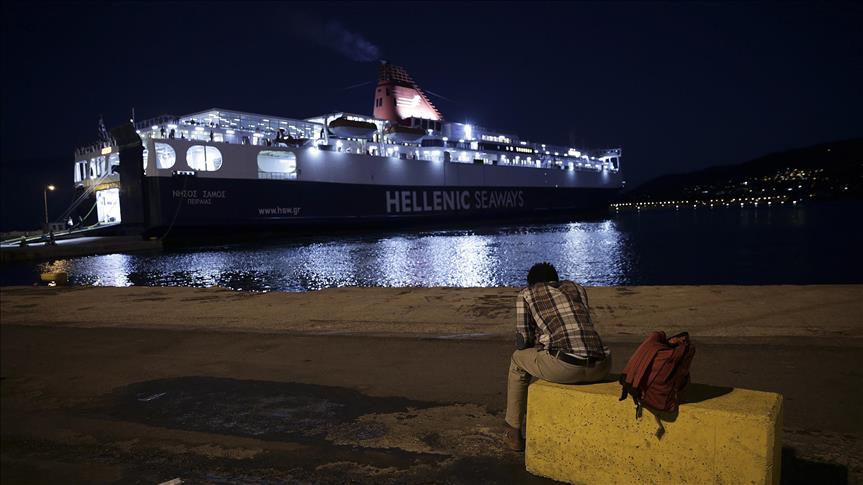Greek island loses out on tourism amid refugee crisis
While tourism in general remains low, tourists from nearby Turkey to Lesbos decline even more post July 15 defeated coup
 A refugee is seen as they wait after a fire at Moria Refugee Camp in Greek Island of Lesbos in Greece on September 21, 2016. ( Ayhan Mehmet - Anadolu Agency )
A refugee is seen as they wait after a fire at Moria Refugee Camp in Greek Island of Lesbos in Greece on September 21, 2016. ( Ayhan Mehmet - Anadolu Agency )
By Idyli Tsakiri
LESBOS, Greece
While tourism in general has taken a hit in Greek islands due to the ongoing refugee crisis, tourist numbers from nearby Turkey to Lesbos have declined even more following the July 15 defeated coup.
In an interview with Anadolu Agency, Spyros Galinos, mayor of Lesbos, said Turkey had been willing to support the economy of the Greek island in the northern Aegean Sea by urging Turks to visit the island.
“We worked with Turkey and we were expecting to have a great deal of help, so we could cover for the losses and financially stand on our feet, regarding tourism,” Galinos said. However “the coup blocked the Turkish tourists for a while and we lost valuable time.”
The July 15 defeated coup in Turkey left 241 people martyred and around 2,200 others injured.
Periklis Antoniou, president of the hotel owners association of Lesbos, agreed with the mayor, and said the recent terrorist attacks in Turkey along with the defeated coup had cost a lot to Lesbos in terms of tourism.
“We experienced a 70 percent decrease in cruises from Turkey,” Antoniou said.
Tourism last summer ‘worst’
Galinos said his island, which continues to serve as a frontline in the refugee crisis, was paying a heavy price.
Antoniou also said the Greek island had suffered a lot this past summer, with the refugee crisis contributing to a major income loss from tourism.
“It was our worst year ever and it was a combination of the financial crisis, the refugee crisis and the Greek bureaucracy and culture,” he said, adding that high taxation, decrease in tourists along with a lack of understanding and support from the Greek government had resulted in turning the island into a financial wreck.
"The numbers are horrific. This was not a decline it was a complete collapse [in tourism]," he said.
“Europe was another major source of tourism but the reservations declined drastically. Minus 68 percent in June, minus 62 percent in July, minus 51 percent in August, compared to 2015.
"We have taken responsibility for all the refugees in the world while the European Union simply sits back and looks," Antoniou added.
But despite the dire economic situation, the Greek mayor said support for refugees would continue. “Finances can be restored, a human life cannot,” he said.
“We have suffered damages. But for me there was never an issue to put in a scale [on] human lives versus financial gain. We knew it would cost us financially but a human life is worth it,” he added.
Locals avoid refugees
Dimitris Papoutsoglou, a cafe owner in a small town called Panagiouda, close to the Moria refugee camp, said not only did he see a major decline in clients, but some of his customers were also avoiding sitting inside once they spot a refugee.
“Some local clients would request their coffee and water to be served in plastic cups if there were any migrants sitting at the cafe,” he said.
He explained that perhaps some people were taking precautions due to unfounded fears that asylum seekers might allegedly be carrying contagious diseases.
He also claimed the town’s proximity to the refugee camp was preventing locals and tourists from coming to his cafe, causing his local business to suffer financially. “When there is trouble and sightings of violence in the camp, people don’t want to visit a nearby town. They are afraid,” he added.
Meanwhile, Galinos insisted the local community has always been supportive of refugees.
“The people of Lesbos did not suddenly change. They didn't stop being democratic or standing in solidarity, they didn't stop being human. They did not suddenly become fascists, this emotion does not even exist in our community,” the mayor said.
“What happened lately is that we are out of strength, we can no longer hold all the weight for Europe, we can handle a smaller weight though,” he added.
EU-Turkey deal ‘too slow’
The Greek islands accommodate nearly 14,000 migrants and refugees out of the over 60,000 currently stranded in Greece, official government figures suggest.
Lesbos is the most crowded of the islands in terms of migrants with a few short of 6,000 residing in official and unofficial camps.
The EU-Turkey refugee deal, which was signed in March, prohibits migrants from leaving their point of entrance in Greece until their asylum requests are processed - a lengthy process that keeps thousands of people in northern Aegean islands in limbo.
Lesbos’ mayor said the outcome of this deal was critical for Europe. “They [European countries] think they can protect the local communities by building walls and refusing to accommodate a small number of refugees.
"The walls help ideas grow, and now they are helping xenophobic, racist and fascist ideas to grow. The real danger for Europe right now is fascism,” he said.
“We have to stop what some are trying to do: to turn this European problem, into an issue regarding the Greek-Turkish relations. It has nothing to do with it. The Greek-Turkish relations are perfect,” Galinos said.
“The real problem is that this deal is not working. This are going slow, it needs to be improved,” he added.
Anadolu Agency website contains only a portion of the news stories offered to subscribers in the AA News Broadcasting System (HAS), and in summarized form. Please contact us for subscription options.



